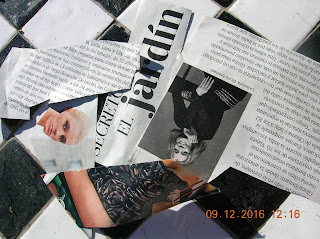Every Saturday, along with Ideal, Andalusia’s newspaper, comes the magazine Mujerhoy, (‘Woman Today’).
This is a rather contradictory publication. On the one hand
it offers stories of women overcoming barriers of gender, class, and sometimes race
and income. In recent weeks we’ve heard about Clara Peeters, a 14th
century painter who ‘swam against the current’ by creating her own works (an
exhibition of these is currently at the Prado); Josephine Kulea, a Kenyan woman
who founded an NGO to rescue girls at risk of genital mutilation; and Harvard
professor Drew Gilpin Faust, whose mother apparently told her as a child that
it was a man’s world. The narrative is usually of individual achievement in the
face of family, gender, class and financial pressures.
We also have recipes, horoscopes, lifestyle articles and
short stories (two recently were about a woman who learned to accept her
difficult mother and another who met a sexy dwarf in a forest). The magazine is
of course full of adverts for cosmetics, clothes and cookie-cutter interviews
with stars endorsing toiletries. Other articles focus on individual emotional growth
and encourage looking inwards, not outwards.
This contradiction between stories of outward-looking independence on the one hand, and tips on making oneself beautiful on the other, is nowhere more stark than in the July
2016 issue, which carried an article on prostitution. ‘Linking prostitution
with free time is the same as justifying kidnapping and slavery,’ said the
headline. It interviewed eight people, mainly from journalism and show
business, (why not women who work or who have worked as prostitutes?) all
talking about how to combat the trade. ‘On this topic there is much social
hypocrisy,’ commented journalist Jesús Cintora.
But turn the page, and what do we see? A fashion shot (part reproduced below) of a sad
pale woman, underdressed and overthin, (in designer clothes made to look cheap),
standing next to a car on a cloudy day near blocks of flats. Hypocrisy indeed.
However, there is no doubt that women’s magazines have to
perform a difficult balancing act. At the end of the day they have to make a
profit, mainly through adverts, which try to sell us an ideal life and
encourage discontent with our own. At the same time they need to tell women
they are forging ahead and achieving more than ever before.
One could interpret all this in a more hopeful way and say
that make-up and fashion companies are subsidising stories of women’s bravery
and achievement. But I wonder whether these stories of achievement themselves
are a type of myth of individuals overcoming the odds – it’s very rare to read
a story about collaboration between women in the pages of Mujerhoy. I suspect the veteran feminist campaigner and founder of
Ms magazine Gloria Steinem would not be
happy (although she is featured in this week’s edition).
The women’s magazine market is extremely competitive, and
content is finely finessed for particular market segments – and stories of
achievement are better in any case than tips on how to keep the curtains clean
or relate to your husband’s secretary. But this isn’t saying very much. I think
of advertisers and editors using whichever narrative they can sell to most readers,
in order to hold onto their jobs and sell products. Perhaps it is up to us to
demand, or try to create, different narratives.
Spanish translation here - a collaboration between
myself, Salvadora of Asociación de las Mujeres Órgiva and Bing Translate.
Original images © Mujerhoy



No comments:
Post a Comment